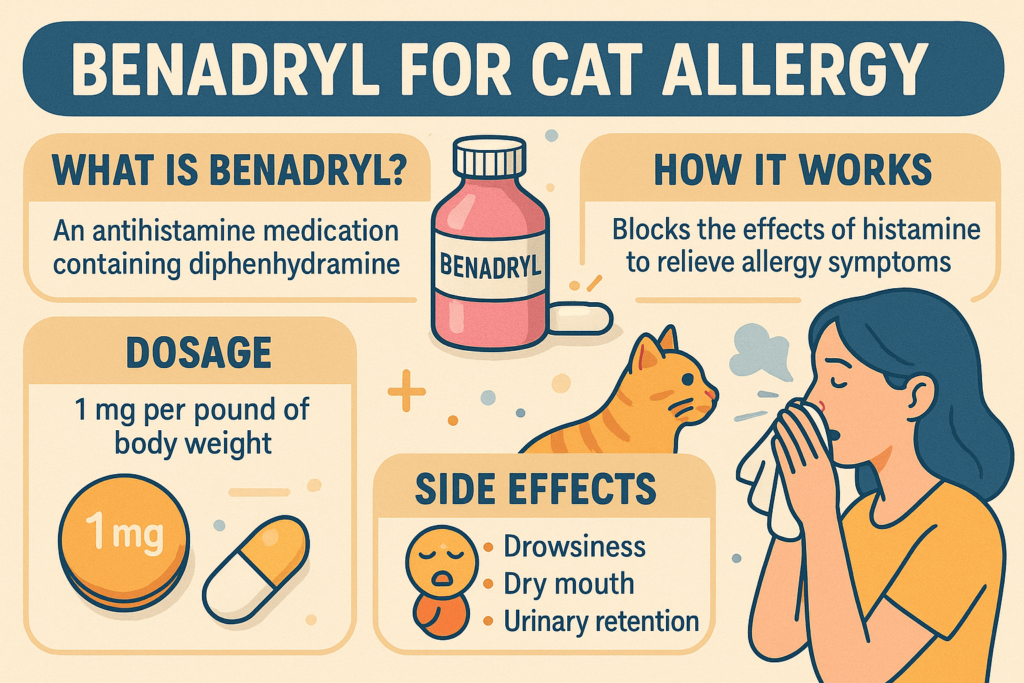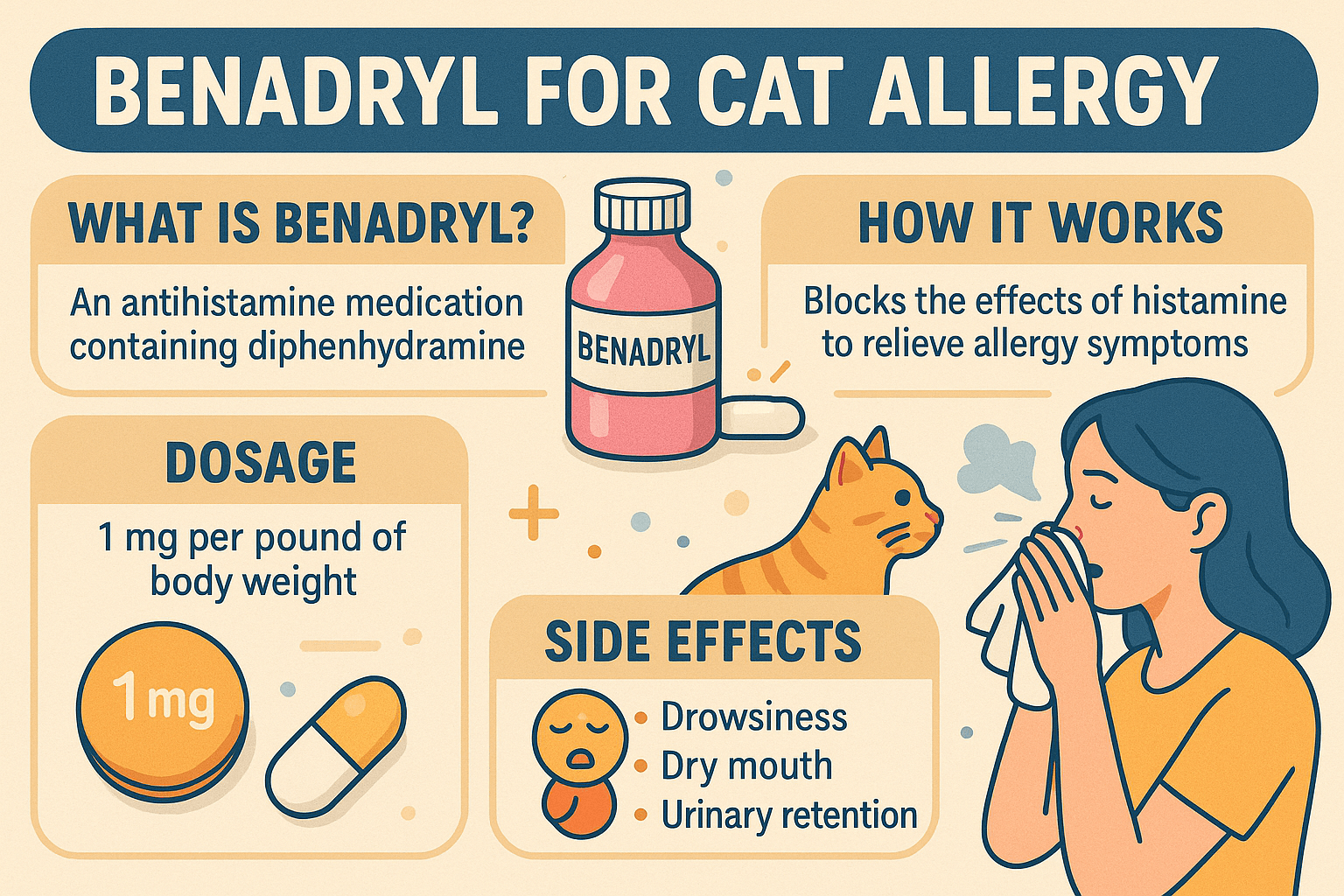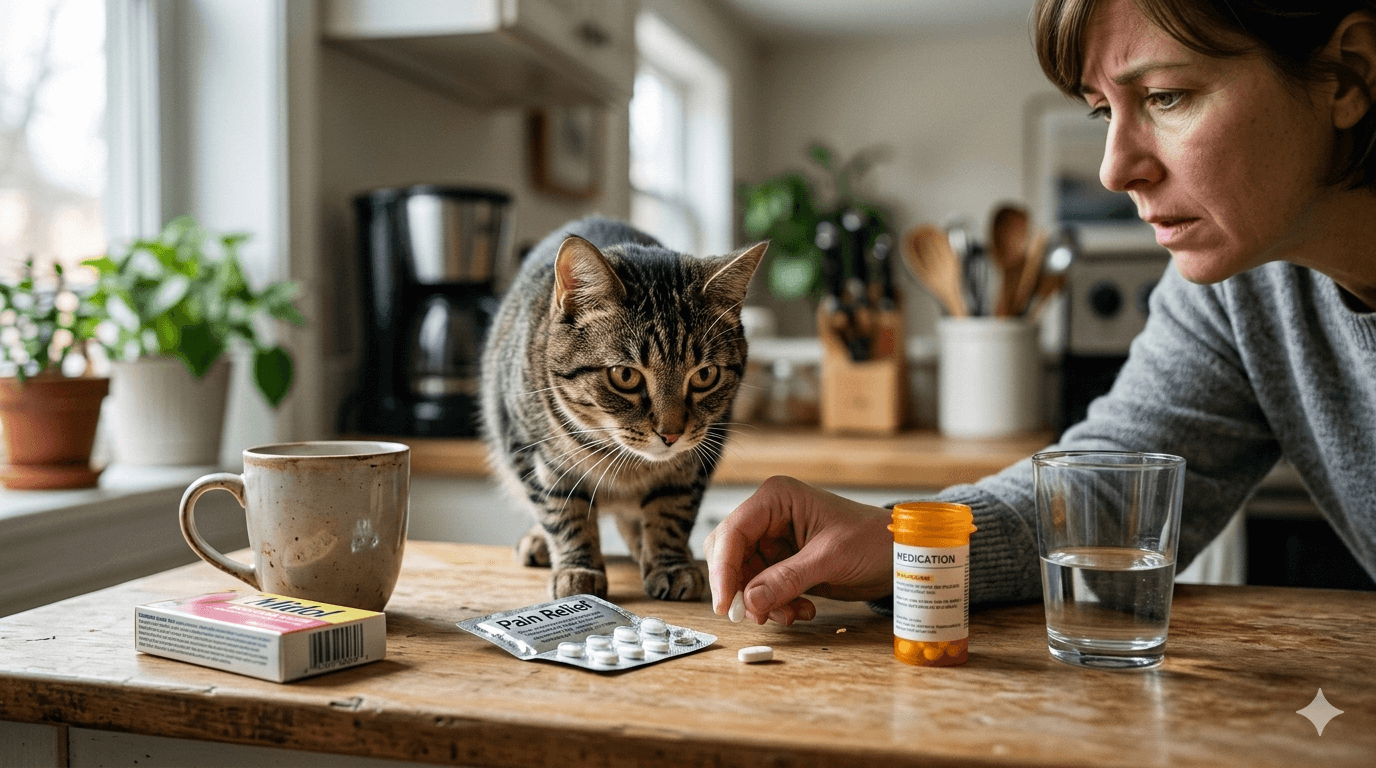Benadryl for Cat Allergy: What You Need to Know
Cats bring joy and companionship to millions of households, but what happens when your furry friend becomes the source of discomfort? Cat allergies are a common issue, affecting both humans and other pets. Symptoms like sneezing, itching, or watery eyes can make life miserable for allergy sufferers. While there are many treatments available, some people turn to over-the-counter medications like Benadryl to manage their symptoms. But is Benadryl safe and effective for cat allergies? In this blog post, we’ll explore how Benadryl works, its potential benefits, and important considerations before using it as a remedy.
Expert Insight on Using Benadryl for Cats
“For a healthy adult cat, diphenhydramine is considered safe to use but should only be given under the direction of your veterinarian. Benadryl for cats should never be administered without specific diagnostic and dosing advice from your vet.”
How Benadryl Can Help with Cat Allergies
Benadryl, an antihistamine containing diphenhydramine, is often used to alleviate allergy symptoms in humans. It works by blocking histamines, the chemicals responsible for allergic reactions. When it comes to cat allergies, Benadryl may offer relief for certain symptoms, but it’s essential to understand its role and limitations.
Relieves Sneezing and Runny Nose:
Benadryl can reduce sneezing and nasal congestion caused by exposure to cat dander.Eases Itchy Eyes and Skin:
For individuals experiencing itchy or watery eyes, Benadryl can provide temporary relief.Helps with Mild Swelling:
Allergic reactions sometimes cause swelling, which Benadryl can help reduce in mild cases.Not a Long-Term Solution:
While effective for short-term relief, Benadryl does not address the root cause of cat allergies.Consult a Doctor First:
Always seek medical advice before using Benadryl, especially if you have underlying health conditions or take other medications.
While Benadryl can be a helpful tool for managing cat allergy symptoms, it’s crucial to use it responsibly and under professional guidance.

Important Considerations Before Using Benadryl
Before reaching for Benadryl to manage your cat allergy symptoms, there are several factors to keep in mind. Understanding these considerations ensures safe and effective use of the medication.
Dosage Guidelines:
The correct dosage varies depending on age, weight, and severity of symptoms. Overdosing can lead to serious side effects.Potential Side Effects:
Common side effects include drowsiness, dry mouth, and dizziness, which may impact daily activities.Interactions with Other Medications:
Benadryl can interact with certain drugs, such as sedatives or antidepressants, so always check for contraindications.Effectiveness Varies by Individual:
Not everyone responds to Benadryl the same way, and some may find it less effective than other antihistamines.Not Suitable for Everyone:
People with conditions like glaucoma, asthma, or heart problems should avoid Benadryl unless approved by a doctor.
Taking these factors into account helps ensure that Benadryl is used safely and appropriately for cat allergy relief.
Check this guide 👉Can Cat Allergies Go Away with Exposure? Best 7 Tips!
Check this guide 👉Understanding Cat Allergy Tests: Best 7 Health Tips!
Check this guide 👉Antihistamine for Cat Allergy: Best 7 Health Tips!
Pros of Using Benadryl for Cat Allergies | Cons of Using Benadryl for Cat Allergies |
|---|---|
Provides quick relief from sneezing | May cause drowsiness and fatigue |
Reduces itchy eyes and skin irritation | Not a permanent solution for allergies |
Widely available over-the-counter | Potential interactions with other medications |
Affordable and easy to use | Effectiveness varies by individual |
Helps with mild swelling | Not suitable for long-term use |
Alternative Solutions for Managing Cat Allergies
If Benadryl isn’t the right fit for you or doesn’t provide sufficient relief, there are other ways to manage cat allergies effectively. These alternatives focus on reducing exposure to allergens and improving overall comfort.
Regular Cleaning:
Vacuum frequently and wash bedding to minimize the presence of cat dander in your home.Air Purifiers:
Use HEPA air purifiers to trap allergens and improve indoor air quality.Allergy Shots (Immunotherapy):
Consult an allergist about immunotherapy, which gradually desensitizes your immune system to cat allergens.Limit Cat Access:
Restrict your cat’s access to certain areas, such as bedrooms, to create allergen-free zones.Groom Your Cat Regularly:
Bathing or brushing your cat reduces the amount of loose fur and dander they shed.
Exploring these options can help you find a sustainable approach to living comfortably with a cat despite allergies.
When to See a Doctor About Cat Allergies
While Benadryl and lifestyle changes can help manage mild cat allergy symptoms, there are situations where professional medical advice is necessary. Recognizing when to seek help ensures your health remains a priority.
Severe Symptoms:
Difficulty breathing, chest tightness, or swelling of the face requires immediate medical attention.Persistent Discomfort:
If symptoms persist despite using Benadryl or other remedies, consult a doctor for further evaluation.Underlying Health Conditions:
Pre-existing conditions like asthma or eczema may worsen due to cat allergies, necessitating specialized care.Medication Ineffectiveness:
If Benadryl fails to provide relief, a healthcare provider can recommend alternative treatments.Long-Term Management Plans:
A doctor can help develop a comprehensive strategy to manage your allergies effectively over time.
Seeking professional guidance ensures you receive tailored solutions for your specific needs.
Common Mistakes to Avoid When Managing Cat Allergies
Managing cat allergies involves more than just taking medication. Avoiding common mistakes can make a significant difference in your comfort level.
Ignoring Regular Cleaning:
Failing to clean your home regularly allows allergens to accumulate, worsening symptoms over time.Skipping Air Purifiers:
Without an air purifier, airborne allergens remain in circulation, making it harder to breathe comfortably.Overusing Benadryl:
Relying too heavily on Benadryl without addressing environmental factors can lead to diminishing returns.Neglecting Personal Hygiene:
Not washing your hands or changing clothes after handling your cat can spread allergens throughout your home.Avoiding Professional Advice:
Self-diagnosing or treating severe symptoms without consulting a doctor can delay effective treatment.
By avoiding these pitfalls, you can better manage your cat allergies and enjoy a healthier lifestyle.
Tips for Reducing Cat Dander in Your Home
Reducing cat dander is key to minimizing allergy symptoms. These practical tips can help you create a cleaner, more comfortable living space.
Bathe Your Cat Monthly:
Regular baths remove loose fur and dander, though not all cats enjoy water—start slowly and reward them afterward.Use Hypoallergenic Bedding:
Opt for hypoallergenic materials that resist allergens and are easy to wash frequently.Vacuum with a HEPA Filter:
Standard vacuums may release allergens back into the air; a HEPA filter traps them instead.Wash Fabrics Regularly:
Curtains, rugs, and cushions harbor dander—wash them weekly to keep allergens at bay.Designate Pet-Free Zones:
Keeping your bedroom or workspace free of pets reduces exposure to allergens during rest or work hours.
Implementing these strategies can significantly reduce dander levels and improve your quality of life.
Signs You’re Experiencing a Severe Allergic Reaction
Recognizing the signs of a severe allergic reaction is critical for your safety. If you experience any of these symptoms, seek medical attention immediately.
Difficulty Breathing:
Wheezing or shortness of breath indicates a potentially life-threatening reaction.Swelling of the Face or Throat:
Rapid swelling can obstruct airways and requires urgent care.Hives or Rash:
Widespread hives accompanied by itching may signal an intense allergic response.Rapid Heartbeat:
An elevated heart rate combined with anxiety could indicate anaphylaxis.Loss of Consciousness:
Fainting or feeling lightheaded is a red flag that demands immediate intervention.
Understanding these warning signs ensures you act quickly in emergencies, protecting your health and well-being.
Frequently Asked Questions About Benadryl for Cat Allergies
Is Benadryl safe for cat allergies?
Yes, but only when used as directed. Always consult a doctor before starting any new medication.
Can I give my cat Benadryl for allergies?
No, Benadryl is intended for human use. Consult a veterinarian for appropriate treatments for your cat.
How quickly does Benadryl work for cat allergies?
Most people experience relief within 30 minutes to an hour after taking Benadryl.
Are there natural alternatives to Benadryl?
Yes, options like saline rinses, herbal teas, and essential oils may help, though effectiveness varies.
Can I use Benadryl daily for cat allergies?
Daily use is not recommended without a doctor’s approval, as it may lead to side effects or dependency.
Finding Balance Between Comfort and Companionship
Living with a cat allergy doesn’t mean you have to give up your love for felines—or vice versa. By understanding how medications like Benadryl can help and exploring alternative solutions, you can strike a balance between managing symptoms and enjoying the companionship of your pet. Remember, every individual’s experience with allergies is unique, so finding the right approach may take time and experimentation. With patience, proper care, and professional guidance, you can create a harmonious environment where both you and your cat thrive.
Can I Give My Cat Midol? Best 7 Expert Tips! – Learn the risks, symptoms, and safe alternatives to keep your cat healthy and avoid toxic reactions.
Can I Give My Dog Midol? Best 7 Expert Tips! – Discover the risks, safe alternatives, and expert advice to keep your dog safe from accidental poisoning.
Maximum Weight for Cats on Planes: Best 7 Expert Tips! – Learn airline policies, tips to stay compliant, and ensure safe travels for your feline friend.
Max Weight for Dogs on Planes: Best 7 Expert Tips! – Discover airline weight limits, safe travel tips, and solutions for flying with your dog stress-free.





